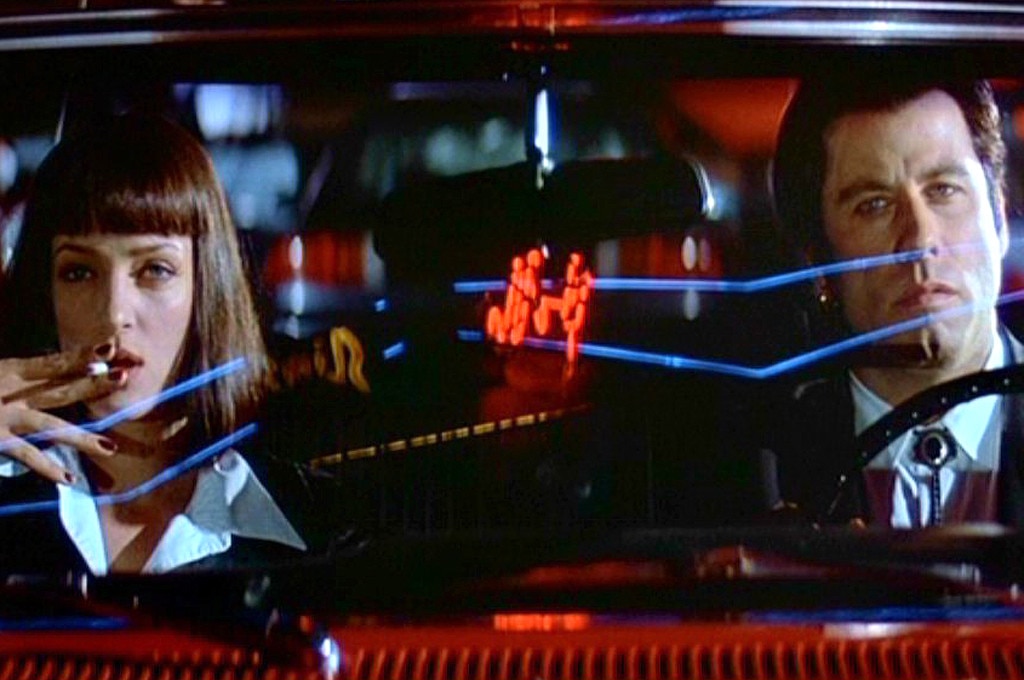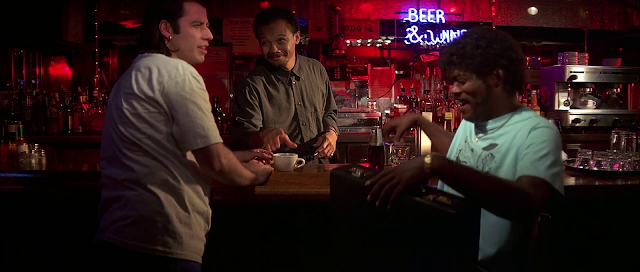

Even if there wasn’t a direct stylistic link between Eastwood’s earnest classicism and Tarantino’s restlessly self-reflexive black comedy, both filmmakers, in their way, embodied the elevation of bloody genre fare into the realm of high art, as well as the corresponding idea that the greatest American filmmakers were often more appropriately appreciated overseas. A few months earlier, Pulp Fiction had been the surprise toast of the Cannes Film Festival and winner of the Palme d’Or, a triumphant choice with its own form of the Spielberg-Zemeckis passing-of-the-torch moment via the presence of jury president Clint Eastwood.

Not that QT had lacked for opportunities to bask in applause. “So I was trying to think maybe I should just say a whole lot of stuff right here, right now. Accepting the Oscar for Best Original Screenplay for Pulp Fiction-which lost in every category Gump won except for Visual Effects-Roger Avary paraphrased Forrest’s famous gag about his lack of bladder control in the spotlight: “I really have to take a pee right now, so I’m going to go.”Īs for Quentin Tarantino, he took the opportunity to backhandedly acknowledge his underdog status: “I think this is probably the only award I’m going to win here tonight,” he grinned.

Even the co-architect of Forrest Gump’s main awards-season rival showed deference. The film’s mix of critical consensus and commercial success (its worldwide box office gross of $678 million placed it behind only Star Wars, Jurassic Park, E.T., and The Lion King at the time on the all-time list) was the stuff of Oscars dominance. My Life in Quentin Tarantino Movies A Pre–‘Once Upon a Time … in Hollywood’ Lesson on the Manson Family How the ‘Inglourious Basterds’ Were Bornįorrest Gump ended up sweeping the Academy Awards-sucking up six wins in total, for Best Picture, Best Actor, Best Adapted Screenplay, Best Film Editing, and Best Visual Effects in addition to Zemeckis’s statuette-a fait accompli. That’s a Bingo! The Best Quentin Tarantino Scenes Ever.
#When did pulp fiction come out movie#
Forrest Gump was his most ambitious movie ever, a galloping American picaresque that visualized the decisive social and cultural upheavals of the mid-to-late 20th century through the eyes of an innocent-a metaphor, perhaps, for its target audience of discombobulated baby boomers trying to make sense of their country on the eve of the millennium.
#When did pulp fiction come out series#
Spielberg had won in the category the year before, for Schindler’s List, and the evident delight he took in announcing the name of his longtime friend and protégé (“Alex, your father just won the Academy Award”) was spontaneous rather than premeditated-a happy coincidence nevertheless bristling with subtext.Īfter directly sending up his mentor in the early ’80s with Romancing the Stone-a wry parody of Raiders of the Lost Ark swapping out square-jawed Harrison Ford for a louche, self-mocking Michael Douglas-Zemeckis had mounted a convincing campaign to inherit his role as Hollywood’s grand entertainer, conjuring up a series of witty, irresistible hits whose integration of old-fashioned tropes with state-of-the-art special effects could only be described as “Spielbergian” with Forrest Gump, he’d harnessed the jokey nostalgia of Back to the Future and Who Framed Roger Rabbit to a newfound sense of historical sweep. It was simple happenstance that Steven Spielberg handed Robert Zemeckis the Academy Award for Best Director in 1995 for Forrest Gump. We’ll drill down on his extraordinary rise from video store clerk to filmmaking legend and talk to the man himself about his long career. To celebrate, we’re looking back at the best of QT-the best scenes, the best stunts, the best dialogue.

This week marks the release of Once Upon a Time… in Hollywood, director Quentin Tarantino’s ninth feature film.


 0 kommentar(er)
0 kommentar(er)
